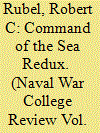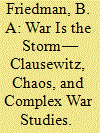| Srl | Item |
| 1 |
ID:
186395


|
|
|
|
|
| Summary/Abstract |
Maritime strategy—the application of a nation’s sea power to achieve its
political ends—can be a complicated, multilayered affair, especially for a
great power such as the United States. American maritime strategy’s complex, and
frankly esoteric, nature is exacerbated by the country’s fragmented, “stovepiped”
military and other governance structures. No single agency has the responsibility,
authority, and perspective both to develop and to execute the country’s maritime
strategy. Thus we observe the clashes between the U.S. Navy and Congress, in
which legislators override both the Navy and the Secretary of Defense, taking
control of naval shipbuilding plans.1
Recently, despite the issuance by the Navy,
Marine Corps, and Coast Guard of the strategy document Advantage at Sea,
Congresswoman Elaine G. Luria (D-VA) felt compelled to write a post calling for
a new maritime strategy of the sort the Navy developed in the 1980s.
|
|
|
|
|
|
|
|
|
|
|
|
|
|
|
|
| 2 |
ID:
186393


|
|
|
|
|
| Summary/Abstract |
China is trying to construct a naval strategy to deny U.S. forces freedom of action in the western Pacific Ocean. Looking back to the U.S. Navy’s last major strategic contest, against the Soviet navy during the Cold War, provides comparisons between Soviet and Chinese strategies that yield insights and analogies that can help develop more effective countermeasures against undesirable Chinese initiatives.
|
|
|
|
|
|
|
|
|
|
|
|
|
|
|
|
| 3 |
ID:
186397


|
|
|
|
|
| Summary/Abstract |
Analysis of the strategies employed by the British navy and Icelandic coast guard during the third Anglo-Icelandic sea dispute, in 1972–73, and the context in which they did so illuminates how modern sea disputes exist in the realm of competition for limited objectives, not warfare, and how the use of force can jeopardize recognition of the claims involved.
|
|
|
|
|
|
|
|
|
|
|
|
|
|
|
|
| 4 |
ID:
186394


|
|
|
|
|
| Summary/Abstract |
In 1992, Ohio State University professor Alan D. Beyerchen published one of the
most important articles on Carl von Clausewitz’s theory. The article identified
aspects of chaos theory and nonlinearity in Clausewitz’s greatest work, On War.
The article’s publication triggered a spate of further articles and books examining war through the lens of chaos theory—a swirling surge of truly innovative
thought in strategic theory. However, this initial flurry did not last long, as strategic theorists became enamored first of the technophilic “revolution in military affairs” and then the post-9/11 focus on counterterrorism and counterinsurgency.
Colin S. Gray, remarking on the subject in 2002, wrote that the debate had “lost
the plot” by moving too far from a Clausewitzian concept of war, with some even
claiming that chaos theory invalidated On War.
|
|
|
|
|
|
|
|
|
|
|
|
|
|
|
|
| 5 |
ID:
186396


|
|
|
|
|
| Summary/Abstract |
New sources of information reveal that in the run-up to the crucial Pacific War Battle of Midway, Admiral Chester W. Nimitz was willing to fight a potential five enemy carriers with two of his own, if Yorktown could not be repaired in time. Why would Nimitz accept those odds, and what likely would have been the outcome had such a battle taken place?
|
|
|
|
|
|
|
|
|
|
|
|
|
|
|
|